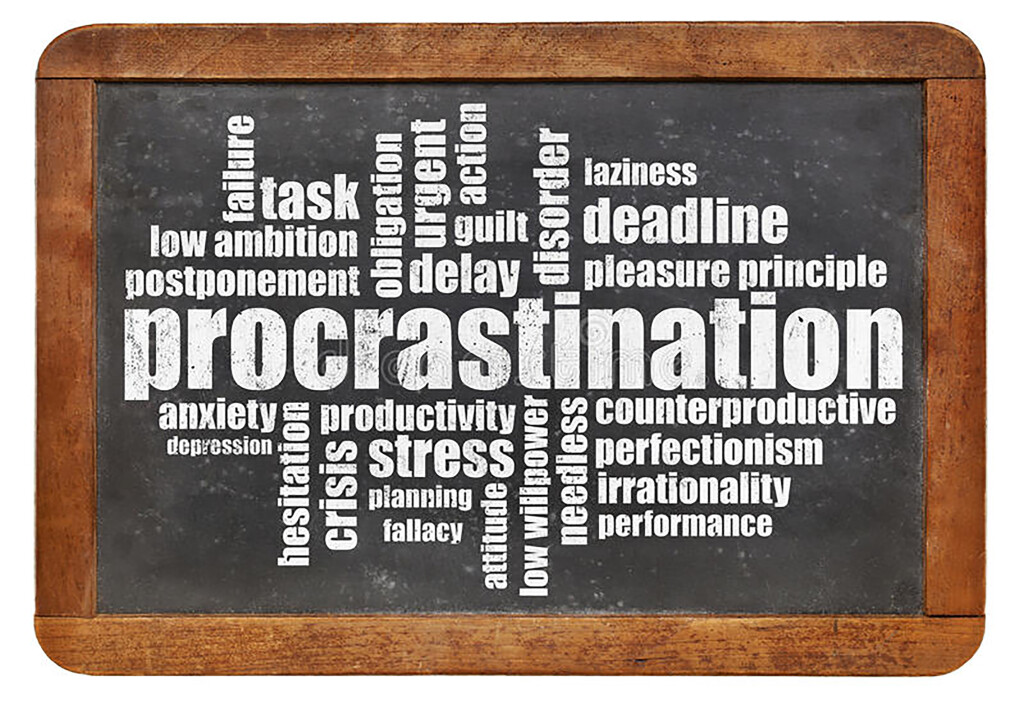“Procrastination is like a credit card: it’s a lot of fun until you get the bill.”
— Christopher Parker
The deadline is one hour away and you still haven’t started on that financial report your operations manager is expecting. What happened?
Sure, you have been busier than usual, had to deal with a couple of crises the past week and suddenly you are faced with that deadline, but you are furious at yourself for not starting it earlier. Of course, you probably spent to long on preparing for that meeting, read and re-read dozens of emails, then replied to them in length, met with that supplier and probably spent too long chatting with them, … but it’s good for building your relationship with them, you took yet another coffee break, you got distracted too many times, because you have no boundaries and your door ‘is always open’ and so on.
You are not alone; we have all been there. You are simply procrastinating, most of us do at one point or another, but for some of us it is a constant thing; it can be crippling and it can hold us back a great deal.
First, what is procrastination?
First of all, it does not mean that you are lazy. You know how hard you are working, how many hours you work each week, what you sacrifice, what you are achieving; it is just that you chose to do or prioritise tasks that you enjoy doing and leave the ones you hate doing for later, ignoring unpleasant tasks even, and you keep postponing them until you are faced with the dreaded deadline and you have no choice but do them.
In her book The Procrastinator’s Handbook: Mastering the Art of Doing It Now, Rita Emmett wrote “The dread of doing a task uses up more time and energy than doing the task itself.”
She was so right; procrastination is one of the key obstacles to productivity and time management. The
thing is, these ‘unpleasant’ tasks are often some of the most important ones, and not doing them or rushing them because they are due now, can cause serious issues. Firstly, it could mean problems at work and getting into trouble with your boss, secondly and more importantly, in the long run, procrastinating may make you feel guilty and could lead to you being demotivated, even disheartened and dissatisfied with your job.
So, what to do to beat it?
As a hospitality manager, that work you keep postponing, perhaps waiting for the right time or being in the right mood, will not complete itself; keep in mind that the deadline is fast approaching.
Plain self-discipline is a great way to manage procrastination, but not everyone has that strength of character to beat it that way; so here are 10 tips for taking action against procrastination:
- Don’t fill your day with low-priority tasks; mix things up when you plan your day. Your list needs to have large important tasks and smaller ones, tasks that you enjoy doing and others, let’s say, that you find a challenge. Check out the Pickle Jar Theory.
- Be organised, have a daily to-do list and make sure you complete every task on it, no matter what (with the exception of unexpected events such as a crisis; in this case, put it at the top of your list for the following day).
- Don’t look at the job too long before starting it. Too much looking can make the job look bigger or harder than it really is.
- If you are avoiding a task because it is something you don’t enjoy doing, find unpleasant or boring, do it first thing and get it out of the way. Then reward yourself by focusing on tasks that you enjoy doing.
- Don’t procrastinate by saying you don’t have time or are looking for a better way to do things. You may be a perfectionist, but not every task needs hours of preparation.
- Don’t encourage your work delays with pleasant activities, such as getting coffee or a snack, socialising, etc.
- Do reward yourself when you don’t procrastinate. Schedule a reward for yourself when you complete a task you would usually put off.
- Manage your tasks in small blocks whenever you can. Approaching tasks this way means that deadlines become more manageable because the task is being completed in small bites over time rather than in one long haul when the deadline is looming.
- Avoid being distracted; ignore emails, put a ‘don’t disturb’ sign on your door, switch off phone and social media, so that you can focus on the task.
- If an important task arises, tackle it straight away; don’t put it off for the next day and let tasks build up until you are snowed under and end up not doing them until it is too late.
 |
Remember, procrastination is the habit of postponing important tasks that you find boring or unpleasant. It can limit your potential, cause issues for the whole team and even damage your career. But like any habit you can work on it and get rid of it.
But the first step is to recognise that what you do is indeed procrastinating, then identify the reasons behind your behaviour so that you can take appropriate actions and strategies to beat it.
You may want to read about procrastination further or even take a course to help you. I have been meaning to write about this for ages; I have been really busy, but perhaps I was just procrastinating. I am a work in progress… but you may find ideas and courses we offer that may interest you. Do get in touch if you have any questions.
Thank you and take care.



